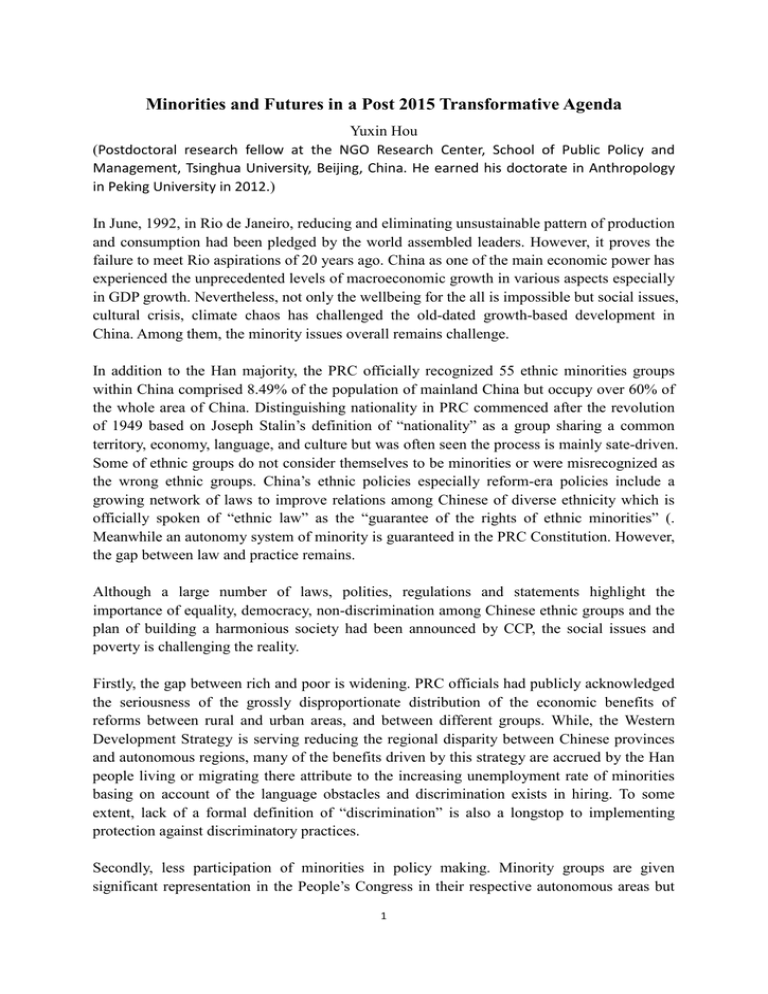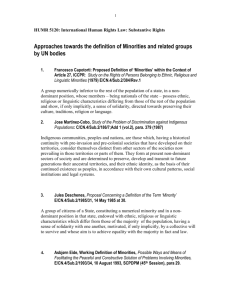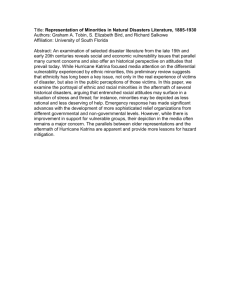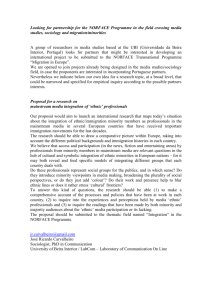Minorities and Futures in a Post 2015 Transformative Agenda
advertisement

Minorities and Futures in a Post 2015 Transformative Agenda Yuxin Hou (Postdoctoral research fellow at the NGO Research Center, School of Public Policy and Management, Tsinghua University, Beijing, China. He earned his doctorate in Anthropology in Peking University in 2012.) In June, 1992, in Rio de Janeiro, reducing and eliminating unsustainable pattern of production and consumption had been pledged by the world assembled leaders. However, it proves the failure to meet Rio aspirations of 20 years ago. China as one of the main economic power has experienced the unprecedented levels of macroeconomic growth in various aspects especially in GDP growth. Nevertheless, not only the wellbeing for the all is impossible but social issues, cultural crisis, climate chaos has challenged the old-dated growth-based development in China. Among them, the minority issues overall remains challenge. In addition to the Han majority, the PRC officially recognized 55 ethnic minorities groups within China comprised 8.49% of the population of mainland China but occupy over 60% of the whole area of China. Distinguishing nationality in PRC commenced after the revolution of 1949 based on Joseph Stalin’s definition of “nationality” as a group sharing a common territory, economy, language, and culture but was often seen the process is mainly sate-driven. Some of ethnic groups do not consider themselves to be minorities or were misrecognized as the wrong ethnic groups. China’s ethnic policies especially reform-era policies include a growing network of laws to improve relations among Chinese of diverse ethnicity which is officially spoken of “ethnic law” as the “guarantee of the rights of ethnic minorities” (. Meanwhile an autonomy system of minority is guaranteed in the PRC Constitution. However, the gap between law and practice remains. Although a large number of laws, polities, regulations and statements highlight the importance of equality, democracy, non-discrimination among Chinese ethnic groups and the plan of building a harmonious society had been announced by CCP, the social issues and poverty is challenging the reality. Firstly, the gap between rich and poor is widening. PRC officials had publicly acknowledged the seriousness of the grossly disproportionate distribution of the economic benefits of reforms between rural and urban areas, and between different groups. While, the Western Development Strategy is serving reducing the regional disparity between Chinese provinces and autonomous regions, many of the benefits driven by this strategy are accrued by the Han people living or migrating there attribute to the increasing unemployment rate of minorities basing on account of the language obstacles and discrimination exists in hiring. To some extent, lack of a formal definition of “discrimination” is also a longstop to implementing protection against discriminatory practices. Secondly, less participation of minorities in policy making. Minority groups are given significant representation in the People’s Congress in their respective autonomous areas but 1 low participation in the high level of National People’s Congress or CPC’s Central Committee. Meanwhile, civil society organizations are facing up with the restrictions on registration and development especially related to politics. Apart from it, website and online discussion regarding with minority issues is also confronting with the stringent censorship and control. Thirdly, cultural development of minorities is challenged in China. According to Xiaotong Fei the late famous sociologist and anthropologist in China, he proposed the influential theory of "Plurality and Unity in the Configuration of the Chinese Nationality" in the view of China became a true ethnic group, the Han, during the Qin Dynasty. This theory is adopted by the policy of promoting the common development of all ethnic groups and preservation and development of the cultures of ethnic minorities in China. However, action lags behind the development of the policy implications and the mainstream ideology dominated by materialism is greatly challenging the fate of ethnic groups in China. To some extent, the local corruption network and conceptual bias turning towards ethnic groups impedes the implementation of central policies hugely related to common development of ethnic groups. Especially, the massive influx of Han Chinese migrants into autonomous areas is worsening the situation in maintaining cultural identity, local language, religious belief, etc. Fourthly, dilemma in minority education. With the rapid development of the campaign aims to achieve the two basics including ensuring access to nine years of compulsory education and eradicating illiteracy by 2010 and preferential policies of enrolling into university in all autonomous areas for minorities, some success in improving access to education has been fulfilled. However, the illiteracy is still a major issue in minority areas because of the poor education and imbalance of educational resources and also hinders the benefit and opportunities of employment. Although the law has enacted that all children in all minority areas have the right to develop knowledge about their own language and culture as well as Chinese, and that they are guaranteed equal opportunities, particularly with regard to access to higher education, the education related to history, tradition and language of minorities is insufficient. Fifthly, discrimination and social conflicts related to minorities. Although discrimination is prohibited by law and policies, the discrimination on minorities still existed in hiring, daily life by some of Han Chinese. Meanwhile, it is worth noting that the discrimination even happened between the big and small ethnic groups in China. Accordingly, the division between Han Chinese and minorities and even between big and small ethnic groups has become one of the roots of social conflicts. Besides it, inequitable development is also responsible for it. From the mentioned above, the question remain related to the real causes behind the issues of minorities confronted in China. My main point is that the GNH-oriented approach with the logic of wellbeing for all including nature, all species, human beings and even the religious domains is the alternative and transformative way of achieving the common development of all ethnic groups and eliminating contradictions between Han and minorities in China 2 gradually. The new sustainability-based growth paradigm and measures of Gross National Happiness implemented by Bhutan have made way out toward sustainable development and also made the good example for China and other countries. The Bretton Woods system of 1944 enshrined GDP as the global measure of progress and prosperity and created institutions to mange a predicted on limitless growth. However, this old-dated paradigm of continuous economic growth and expansion in our finite world is not a must and the production and consumption mode does not mean happier or wellbeing for all. What is being born is less clear but in no way less significant. It is a future that we can sense, feel and actualize by shifting the inner place from which we operate. The inner shift, from fighting the old to sensing an emerging future possibility, is at the core of profound awaking today. It is shift from an ego-system awareness that care about the well-being of oneself to an ecosystem awareness that care about the well-being of all, including nature, all the species, humans and even the religious sphere. All in all, this is also the process of returning to “we” from “I”. However, the measurement of wellbeing or Gross National Happiness is contextualized and demands the localization of this new paradigm. In China, the implementation of GNH needs the consideration of complexity of diverse situation referring to local history, culture, religion, politics, etc. Meanwhile, how to deal with the relation between GDP and GNH is worth further discussion. Reference Royal Government of Bhutan, Time for a Sustainable Economic Paradigm (Input for the draft outcome document for rio+20), Fei Xiaotong. See the web link: http://en.wikipedia.org/wiki/Fei_Xiaotong The Global Presencing Forum: From Ego to Eco-System Economies-Creating Well-Being for All. See the web link: https://www.presencing.com/sites/default/files/user-files/GPF_2014_Brochure_Final.pdf Ethnic Minority in China. See the web link: http://en.wikipedia.org/wiki/Ethnic_minorities_in_China Barry Sautman, 1999, Ethnic Law and Minority Rights in China: Progress and Constraints, Law & Policy, Vol. 21, No.3. HRIC. 2007. China: Minority Exclusion, Marginalization and Rising Tensions 3






